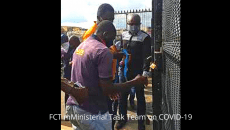By Anayochukwu Agbo and Tony Manuaka
Abuja, the nation’s capital is counting the cost of the sudden postponement of the presidential and national assembly elections by one week at the eleventh hour. Streets, markets, worship places big and small businesses lie desolate as people stayed at home in confusion.
The ever bustling Wuse Market, busy Central Business District and garrulous Garki all lie desolate. big and small businesses are counting the cost of not holding the elections scheduled.
International election observers from all over the world, some of whom flew in after the postponement, are caught in the web. They now have do a supplementary budget that will fund them in Nigeria for an extra week, go back home and return next Friday or just forget the election and go home. They would be paying for additional local transports, feeding and accommodation for another one week.
Non-governmental

For the federal government, the cost would also be enormous. The Independent National Electoral Commission, INEC, had initially confirmed it had mobilized men and materials to polling stations across the country. It is going to cost much more to sustain them at those locations or demobilize them and mobilize them again next weekend.
There is also the issue of security of the polling materials also deployed. The idea of releasing the ‘sensitive materials on the eve of the elections was to safeguard them from being counterfeited or traded. With one week to play around with, it is feared most of the documents can be conveniently reproduced, making rigging much easier.
The parties, especially APC and PDP are also going to spend more in additional campaign funding, especially on advertisement.
In other parts of the country, the impact of the postponement is also being felt even at individual level. Traders who live around the INEC office in Yaba, Lagos also have their tale of woes to tell.
One of the traders who prepared food for sale inside Birel Secondary School beside INEC office said she really prepared for this election not knowing it was going to be postponed. She had prepared assorted meals in preparation for the day. But by mid day on what should have been the election day, she was groaning over the postponement and the envisaged loss, saying, “I am speechless.”
Another woman who sells soft drinks fell into slumber due to frustration and disappointment over the postponement. She later explained to our reporter that she was just thinking of how to repay the loan she collected from a microfinance bank.
On St. Agnes Street, within the INEC neighborhood, a beer parlor operator lamented the shifting of the election after he had stockpiled drinks in anticipation of a long holiday, hoping for massive sales as is common during such occasions.
On the eve of the elections that were postponed by INEC, the Gbenga Aregbesola family of Ilesha in Osun State was a full house. Many of the family members had travelled from their different places of abode especially, Lagos to their home state where they registered to vote. One of the implications was that the head of the family had to make an elaborate provision for the feeding of everyone that came around for the election in terms of feeding and other welfare needs.
Aregbesola told the magazine that by the eve of the election that was postponed he had spent about a hundred thousand naira on food stuff for the average family. With the postponement of the election he laments how he is going to cope when the family members return for the new date fixed for the elections.
Like the Aregbesola family, every individual and corporate organization that prepared for the election now has a tale of what they lost to tell. In many states of the federation, holidays were declared ahead of the elections. In Lagos for instance, schools were closed for three days beginning from Thursday, two days ahead of the elections and Monday of the following week. The federal government also closed unity schools ahead of the elections. Parents and guardian had to make additional expenses to take their wards home for the break. Many Nigerians who planned one form of social engagement or the other now have to contend with not only additional costs but also a disappointment that may shatter their dreams. For many who have fixed their weddings within this period, the shifting of the election dates is most likely to take the shine off the wedding.
In the transport sector, business came to a halt as government imposed a 6am to 6pm restriction of movement. Land borders were shut, and air travels were not also allowed by aviation authorities.
Additional report by Murtala Aleem

 WhatsApp us
WhatsApp us